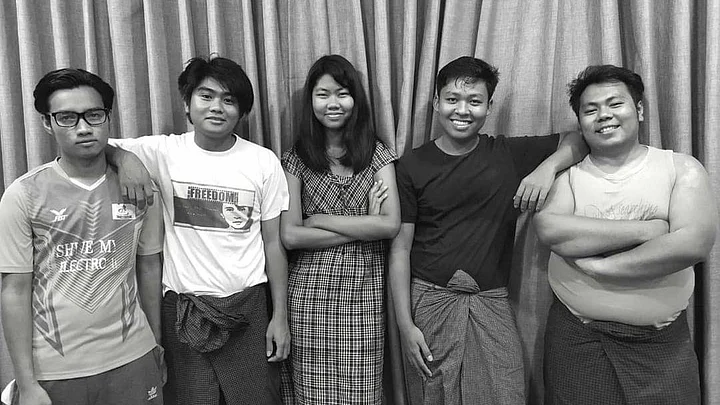A group of Myanmar satirists on Monday, 18 November, racked up a second prison sentence for a performance that criticised the military, a decision the artists said showed the judges were "puppets" of the military.
The group of seven, known as the Peacock Generation, were arrested after performing "Thangyat", a Myanmar art similar to slam poetry, in April.
Wearing military uniforms, they mocked the army through their fusion of poetry, comedy and music.
But the authorities were unamused and the troupe, held in prison for months already, are facing several cases.
‘Judges Used by Military to Bully Civilians’
Six of the seven were on Monday jailed under Section 505(a) of Myanmar’s Penal Code. The law criminalises any intent to cause officers or soldiers "to mutiny or otherwise disregard or fail in their duties".
"They are found guilty of being disrespectful towards the military. That is why they are sentenced to one year in prison," Judge Mg Mg Thet told the packed Yangon courtroom.
Despite the group's relief that at least one had escaped prison this time, the performers' anger at what they regard as injustice was palpable.
“The judges are being used by the military as puppets to bully civilians,” 21-year-old Kay Khaing Tun, one of those jailed, told journalists outside the courtroom.
This is the second conviction under the same law within weeks.
In October, five of the group were handed down a one-year sentence at a different Yangon court.
Peacock Generation Faces Numerous Cases
Due to a controversial quirk of Myanmar’s judicial system, the group can face the same charges in different townships.
Since the artists performed in various locations, they now face numerous cases.
For posting photos and videos on Facebook, all the satirists also face charges under Section 66(d) of the Telecommunication Act for "online defamation", an offence that carries a maximum two-year sentence.
All jail terms will be served concurrently but each will only start from the date of sentencing.
Defence lawyer San San Myint told AFP they planned to appeal to the President and civilian leader Aung San Suu Kyi.
Nicholas Bequelin from Amnesty International branded the trials as "ludicrous" and called for the convictions to be immediately quashed and all further charges dropped.
They are "signs of a relentless assault on freedom of expression in Myanmar," he said.
He also urged Suu Kyi's ruling party to use its majority in parliament to abolish the various "draconian" laws.
Rights groups say more than 250 people faced criminal cases under laws restricting freedom of expression in the first six months of 2019 alone.
The artform "Thangyat" used to be banned under military rule but has been allowed again since 2013 and is normally performed at Myanmar's New Year water festival in April.
(Published in an arrangement with PTI)
(At The Quint, we question everything. Play an active role in shaping our journalism by becoming a member today.)
